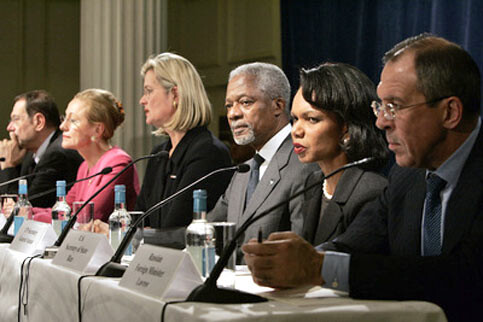The Electronic Intifada 10 February 2006

The Middle East Quartet concluded on January 30 that it was inevitable that future assistance to any new government would be reviewed by donors against that governments commitment to the principles of nonviolence, recognition of Israel, and acceptance of previous agreements and obligations, including the Roadmap. (UN Photo)
SDEROT — In and around Israel’s “capital of the Qassam rockets,” where I teach, the victory of Hamas in the Palestinian elections has left Israelis as divided as always. While some think that it can be a positive development - as Hamas is probably the sole Palestinian party capable of delivering on a binding Israeli-Palestinian agreement - others deem this wishful thinking and believe the existing Israeli-Palestinian gridlock will continue for years to come. A recent poll reflects this ambivalence with 48% of Israelis favoring a dialogue with Hamas and 43% against.
Amid this internal Israeli debate, the United States, the European Union, Russia and the United Nations - the so-called Middle East Quartet - delivered an insufficiently helpful message. Erroneously convinced that they had ‘lined up in solidarity’ with us, Israeli Jews, the Quartet lost no time declaring that Hamas “must be committed to nonviolence, recognize Israel and accept the previous agreements and commitments.”
Appropriate as these words may or may not be, even entering students in Sderot understand that any political tango takes two to succeed and that singling out Hamas for special treatment is certain to benefit neither Israelis nor Palestinians in this troubled land. Why, therefore, has the Quartet never declared that “Israel must be committed to nonviolence, recognize a Palestinian state and accept the previous agreements and commitments”?
Self-proclaimed “pro-Israeli” individuals are likely to label this proposition preposterous; yet the honest among them must recall two empirical facts. First, an examination of the pattern of “violence” of the past five years reveals that the Palestinian-Israeli ratio of deaths stands at 4:1. Thus, ending this violence depends as much on Israel’s compliance with the Quartet’s terms as with the Palestinians.
The second fact to remember is that - together with the entire Israeli Likud party - then-MK Ariel Sharon, then-MK (and now acting Prime Minster) Ehud Olmert, and then-and now-Likud leader Benjamin Netanyahu, all worked in concert to undermine what is known as ‘the peace process’ during the 1990s (much like Hamas); they all happened to vote against both the Oslo Accords in September 1993 and the Oslo II agreement in November 1995, when they came up for ratification in the Knesset. In addition, Netanyahu vociferously opposed the 2003 Road Map - including Israel’s fourteen reservations that effectively preempt the plan - but for tactical reasons abstained during the vote. As for acting Prime Minister Olmert, as late as December 5, 2003 (while serving as Vice Prime Minster) he declared in Yedi’ot Ahronot, Israel’s most circulated daily:
“Had I believed that there was a real chance of reaching an agreement [with the non-Hamas Palestinian Authority] I would have recommended making an effort. But that is not the case.” What is needed is “a comprehensive unilateral move. Through such a move we will define our borders, which under no circumstances will be identical to the [1967] Green Line and will include Jerusalem as a united city under our sovereignty.”
The Quartet was never bothered by the fact that Olmert’s notions are impossible to square with even the opening paragraph of the 1993 Oslo Accord (that Hamas is now being pressured to accept) which reads as follows:
“The aim of the Israeli-Palestinian negotiations … is … to establish a Palestinian interim self-government … for a transitional period not exceeding five years leading to a permanent settlement based on Security Council Resolutions 242 and 338.”
In light of the Quartet’s recent call to Hamas, and its simultaneous continued silence vis-a-vis the policies and practices of Netanyahu’s Likud - and Sharon and Olmert’s Kadima offshoot - it seems that the Quartet cares in fact very little about Oslo’s principal aim. The Oslo agreements were supposed to be based on a mutually agreed-upon implementation of the 1967 UN Security Council Resolution 242 that, among other things, stipulates the inadmissibility of the acquisition of territory by war and affirms the withdrawal of Israeli armed forces from the territories occupied in the 1967 war. To be sure, it is the democratic right of any Left or Right Palestinian or Israeli party/constituency to accept or reject previous agreements. But if Hamas’ rejection is now an absolute non-starter for the Quartet - and may even lead on conditioning or cutting aid to the Palestinian Authority - then logic seems to require that this should be the case also with regard to Israel. Israel’s elected ruling party of the last four years - whose principal members will most likely continue to rule Israel under the new Kadima repackaging party after the upcoming elections in March - have shown nothing but contempt for previous negotiated agreements during the last decade, in either formal or informal spheres of sociopolitical action.
If the Quartet - or anyone else for that matter - genuinely cares for the wellbeing of us, Israelis and Palestinians, they should cease playing the game of lopsided demands. For any hope to bring us nearer to a just and peaceful settlement, reciprocal demands should be made not just on the democratically elected representatives of the stateless occupied society, but also on those of the occupying state. Ultimately, that would be the most pro-Israel stance of all. And if there would be no peace in Beit Hanoun, there certainly wouldn’t be peace in Sderot as well and vice versa.
Moshe Behar holds a PhD in Comparative Politics from Columbia University and teaches in Sderot..
Related Links

